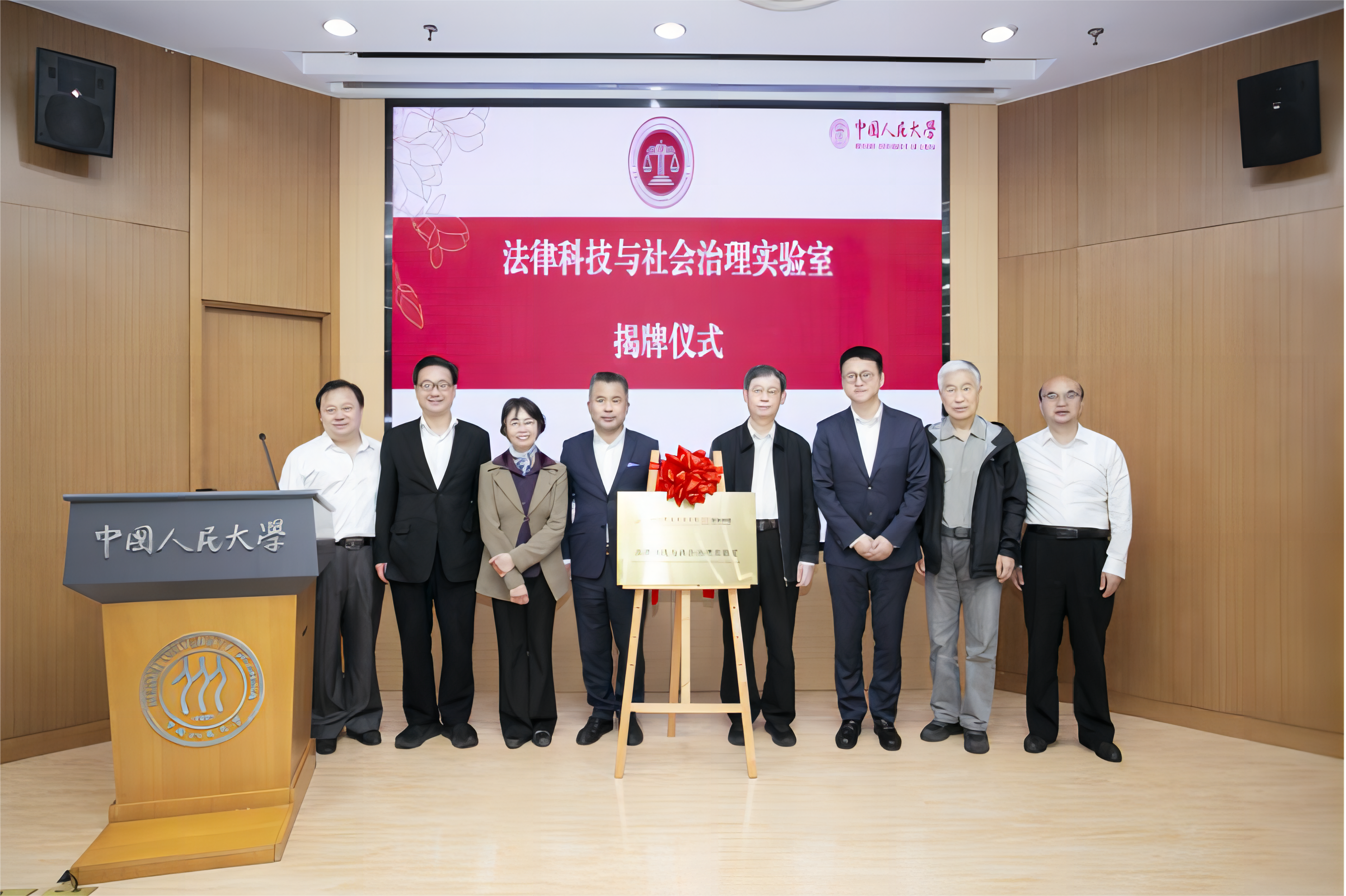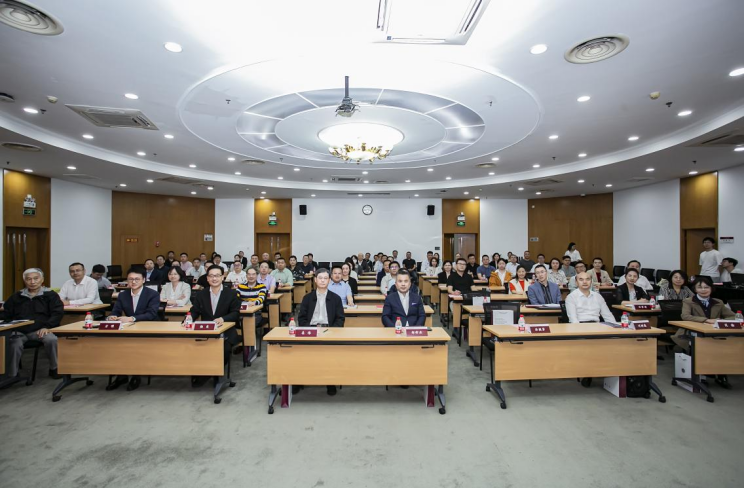On the afternoon of May 17, 2025, the "Forum on Artificial Intelligence and Dispute Resolution (2025)" and the inauguration ceremony of the Legal Technology and Social Governance Laboratory, hosted by School of Law, Renmin University of China (RUC) and the Preparatory Office of Legal Technology and Social Governance Laboratory of RUC, and co-organized by Hangzhou Hanzi Information Technology Co., Ltd., were held at Yifu Hall of RUC.
Numerous experts and scholars from the legal academia, judicial practice departments, and technology enterprises gathered to discuss the practical applications and cutting-edge developments of AI technology in dispute resolution, while conducting in-depth research on the theoretical foundations and implementation pathways of AI-assisted legal dispute resolution
The opening ceremony and laboratory inauguration of the first session were presided over by Yang Dong, Dean of the School of Law, RUC.
Zheng Xinye, Vice President of RUC, extended congratulations on behalf of the university for the forum's convening and the laboratory's establishment. He noted that as the new round of technological revolution and industrial transformation deepens, frontier technologies including artificial intelligence are rapidly integrating into various socio-economic domains, presenting both challenges and opportunities for dispute resolution systems.
Zheng emphasized that AI applications should not replace the rule of law but rather reshape and empower it. Maintaining the baseline of fairness and justice while promoting human-centered, technologically controllable, and responsibility-clarified intelligent governance ecosystems represents a shared mission for the legal community.
Jiang Wei, President of the Cyberspace and Information Law Research Association of China Law Society and Deputy Director of the Supreme People's Court Advisory Committee, congratulated the event on behalf of the association. He stated that AI serves as a strategic technology leading the new technological revolution and industrial transformation. In the digital era, fundamental changes in social governance methods have occurred, with emerging technologies like AI creating new conditions for constructing modern dispute resolution mechanisms.
Jiang emphasized that the deep integration of AI and legal system construction has become an inevitable trend. He specifically proposed maintaining three balances: between technological innovation and legal principles, between efficiency enhancement and equitable accessibility, and between domestic legal systems and international rules. He expressed anticipation that the Legal Technology and Social Governance Laboratory would orient itself towards serving legal practice through technological innovation, contributing RUC's wisdom to building a fair, efficient, and inclusive modern dispute resolution mechanism.
Yang Dong, Dean of the School of Law, RUC, expressed sincere gratitude to leaders and experts for their long-term care and guidance to the law school. He stated that the School of Law attaches great importance to legal technology innovation and remains committed to promoting the development of legal technology and AI large models. The laboratory's establishment represents an important initiative in exploring the integration of cutting-edge technologies with the rule of law. Yang revealed that the school will soon release a "Foreign-Related Rule of Law Large Model" to further serve the national foreign-related legal system construction and new patterns of international competition.

Jiang Wei and Zheng Xinye jointly unveiled the laboratory plaque.

Following the inauguration ceremony, the forum proceeded with thematic keynote presentations divided into sessions on "Practical Experiences of AI in Dispute Resolution" and "Theoretical Perspectives on AI Dispute Resolution".
The second session on "Practical Experiences of AI in Dispute Resolution" was moderated by Liu Shude, Deputy Director of the China Applied Law Research Institute.
Fang Ming, Chairman of Hangzhou Hanzi Information Technology Co., Ltd., delivered a keynote speech titled "Application Methods of AI in Batch Case Models". Analyzing the background of surging social disputes, he detailed the AI dispute resolution model developed by his company, particularly suitable for handling similar cases including financial small-claims cases, property disputes, intellectual property disputes, and traffic accident disputes.
Fang noted that AI has significantly reduced model construction costs and cycles, enabling region- and industry-specific refined mediation while substantially improving dispute resolution efficiency. He proposed the concept of a comprehensive mediator management system, emphasizing that professional management and training of mediator teams constitute the key to genuine conflict resolution.
Huang Yan, Vice President of Haimen District People's Court in Nantong, Jiangsu Province, introduced the development and application of the "All-Scenario Intelligent Trial Assistance System". She elaborated on the system's working mechanisms from five aspects: clarifying system positioning, focusing on the core of judicial fairness, establishing bottom-line awareness, strengthening organizational implementation, and concentrating on objectives and tasks.
Wang Shuo, lawyer from Liaoning Anxing Law Firm, demonstrated a self-developed legal document automation system from a practitioner's perspective. Using labor dispute cases as examples, he showcased the system's functions including information collection and entry, case analysis, evidence collection guidance, generation of evidence catalogs, automated content generation for litigation materials, and document formatting.
Wang stated that the system dramatically improves work efficiency by generating legal documents within short timeframes that traditionally required extended periods, while enhancing accuracy through selective Q&A interfaces. He expressed hopes for future integration between lawyer systems and court systems to form technological collaboration within the legal professional community.
The third session on "Theoretical Perspectives on AI Dispute Resolution" was moderated by Peng Xiaolong, Professor at School of Law, RUC.
Professor Wang Chenguang from School of Law, Tsinghua University, conducted a theoretical exploration of the achievements and challenges of AI intervention in dispute resolution. He noted that AI's involvement could bring tremendous innovation to trial models and capability enhancement, but achievements coexist with challenges.
Wang identified five major risk points in AI dispute resolution: how large model architecture design incorporates rule-of-law thinking rather than simplistic legal textualism; how data input processes avoid carrying implicit ethical, cultural, and economic considerations; how users issue correct instructions; achieving human-machine alignment to ensure machine decisions conform to human values; and guaranteeing continuous upgrades of AI systems. He emphasized that AI serves as a tool for handling human social disputes, requiring close collaboration between legal and technical professionals.
Hu Changming, Associate Researcher at the Institute of Law of the Chinese Academy of Social Sciences, analyzed "The Judicial Value of Artificial Intelligence" through four dimensions: Chinese context, characteristics of Chinese AI, current challenges, and future prospects. Hu outlined five challenges facing judicial AI: uncertainty of legal norms, diversity of facts, complexity of judicial reasoning, doubts about robot-led trials, and difficulties in judicial value judgments. Accordingly, he proposed that AI could serve three future judicial roles as judges' "external brain", "avatar", and "senior consultant", but would struggle to fully replace human judges' value judgments.
Deng Jinting, Professor at School of Discipline Inspection and Supervision, RUC, addressed "Computerized Expression of Legal Rules", exploring how to better employ AI in handling complex legal issues. She emphasized that in the context of explosive growth of legal relationships in the digital age, structured methods and tools are needed to make legal rule expressions more comprehensive, flexible, and sophisticated.
Professor Deng stressed that AI adoption requires mutual adaptation, with legal professionals needing to acquire computational thinking. Through concrete cases, she demonstrated how to computationally express legal rules into executable judgment flowcharts. She called for cultivating computational thinking in legal education to promote AI applications in legal disciplines and facilitate overall disciplinary upgrading.
Professor Fan Yu from School of Law, RUC, Consultant of the Dispute Resolution Research Center, presented three perspectives on AI and dispute resolution. Fan endorsed vigorous application of AI technologies in existing dispute resolution fields, believing AI can effectively compensate for human limitations and avoid low-level errors in judicial practice. Simultaneously, she maintained that fundamental legal theories remain relatively stable, advocating maintaining theoretical steadfastness without excessive conceptual innovation for digital-era dispute resolution. Current research should focus more on operational issues rather than excessive theorization.
Finally, from the perspective of dispute resolution patterns, Fan noted that many countries have institutionally diverted specific dispute types from courts to effectively prevent "litigation explosions". She suggested that under current circumstances, technological breakthroughs and foundational efforts might represent a practical path forward, while also urging attention to deeper issues behind growing litigation volumes.
Currently, artificial intelligence is reshaping legal practice with unprecedented speed and breadth. School of Law, RUC will continue to root itself in Chinese realities while engaging with global frontiers, persist in combining theoretical innovation with practical exploration, and promote deep integration of AI with legal education, scientific research, and social services. The Legal Technology and Social Governance Laboratory will collaborate with various sectors to develop practical models in technological research and development, conduct profound theoretical reflections, and advance a series of initiatives in talent cultivation, curriculum development, and teaching material construction.


